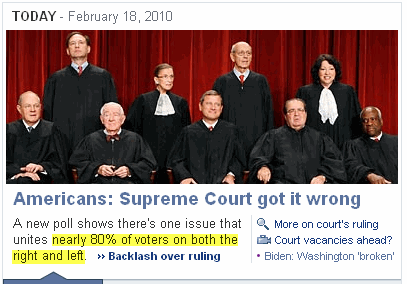The US is having major problems in its national governance – voting in the Senate now requires not just a simple majority but a super majority of 60 votes. The Republican Party is playing a dangerous game of governance chicken by upping the ante on what bills will be filibustered – where they hold up debate until a cloture vote of 60 or more senators closes down the filibuster. In effect, now the Republicans have said not just a few bills of national import will be filibustered but all Senate bills. So to get any legislative work done, a vote in the Senate now requires 60 or more votes.
This threat is only good if a)the Republicans do indeed filibuster every bill [and they have signaled the willingness to do so] and b)the GOP can maintain strict party discipline on voting such that no Republican crosses the aisle to vote with the Democrats [and lobbyists have worked to insure that iron discipline by making clear that campaign finance rewards are keyed to “no crossover votes whatsoever”]. To this situation, one adds two other major factors [among many] contributing to imperiled governance: 1)gerrymandering and 2)campaign finance.
Lets look at gerrymandering [is a form of boundary delimitation (redistricting) in which electoral district or constituency boundaries are deliberately modified for electoral purposes, thereby producing a contorted or unusual shape.] first.There is controversy as to whether gerrymandering works well over time, but evidence is mounting that gerrymandering not only skews elections results but favors incumbents.
Now consider campaign finance. Here there is no doubt among political scholars that US campaign finance rules not only influence elections but also impact ongoing legislative work. Over 90% of incumbents in Congress who rerun for election are re-elected, and campaign finance is a major contributor to election stagnation. But of even more import is the fact that reserch shows a link between campaign finance with lobbying and then lobbying influencing/shaping information research by legislators. Son it is no wonder that lobbying and its associated political financing are growth industries in Washington.
So what does the Supreme Court do in late January given this climate of increasing unworkable governance in the US influenced mightily by exponentially growing campaign and lobbying finances by special interest groups?? You guessed it. Instead of moderation and control, it has made unlimited campaign and lobby financing the law of the land. Reversing 30 years of other Supreme Court precedence and over 100 years of fighting the perverted influence of money in politics – The Supreme Court equated money with free speech and corporations/special interest groups with individual voters. We identified this as a disastrous decision. And now the American Public has also done so as well in a recent ABCNews/Washington Post poll.
But the problem is that this decision is now the law of the land. And the consequences are already rippling through Washington. What is there to prevent the Too Big Too Fail banks from hiring a savvy lobbying group and have them say “with tact” to key legislators – “you are up for re-election this Fall. If you support either the Volcker reforms or other key features of the Financial Reforms legislation, our sponsors have instructed us to tell you that will spend whatever it takes to get your opponent to win in the Fall”. Think this is only possible in Thriller novels ? Then read what Goldman did for its clients who it sold complex derivatives to – or how they advised the Greek government at near bankruptcy. It appears the Supreme Court, layered in custom and academic tradition, absolutely ignored the fact that US Finance and Politics has evolved into a full body sport. Or maybe the 5 yea Justices knew this only too well.

